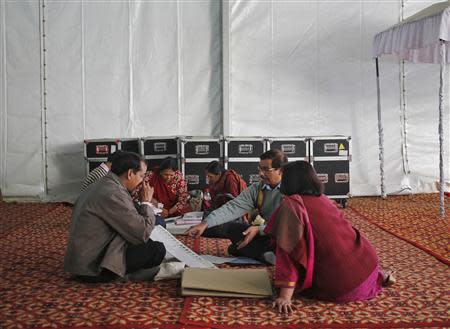Delhi's rubble-strewn Connaught Place mirrors ruling party's election struggle
By Frank Jack Daniel NEW DELHI (Reuters) - The broken paving stones and exposed cables that mar the neo-Georgian grandeur of India's prime shopping precinct give a glimpse into why the ruling Congress party might struggle to hold on to the capital Delhi in a local election on Wednesday. Work is still unfinished on a costly face lift to Connaught Place that was meant to showcase Delhi to the world for the 2010 Commonwealth Games and businesses located in what is some of the world's most costly office real estate are furious. The main opposition Bharatiya Janata Party (BJP) is hopeful a widespread perception that government corruption and incompetence is to blame for shambles like Connaught Place's facelift will feed into voter anger at high prices and unsafe streets, and help it unseat Chief Minister Sheila Dikshit after 15-years in office. "We are fed up, for the last five years we have lost our business, we had to lay off four employees, we couldn't pay their salaries," said S.P. Jain, a smartly-suited travel agent and money changer in Connaught Place, speaking over the sound of drilling as workmen dug up the pavement outside the shop he has run since 1963. "Wherever Congress is ruling, there is corruption," Jain said, echoing a complaint heard across India. The Congress-led national government was voted back to power in 2009 thanks to strong economic performance and populist schemes, but has since tried voters' patience with a string of corruption scandals and economic missteps. The Delhi election could give some insight into how the world's biggest democracy votes in general elections due by May 2014. Losing the national capital Delhi to the opposition would be a symbolic blow for the Congress party in its lead-up to general elections. CONGRESS SEEKS DELHI BOOST In Delhi, Dikshit is credited with modernizing the city with a metro train, a network of flyovers and progressive policies such as running buses and taxis on natural gas. But the botched hosting of the Commonwealth Games in 2010 cost her a lot of goodwill. The Games were supposed to be a statement of India's arrival on the world stage. At the time its economy had deftly bounced back from the global financial crisis. Instead, project overruns, corruption and shoddy workmanship focused attention on India's lingering problems. Facing a strong challenge from the BJP's prime ministerial candidate Narendra Modi, the Congress party is keen for a boost from the Delhi poll and four other state ballots held in recent weeks to breathe life into its so-far lackluster national campaign. Results for all five elections are due on Sunday. But there is palpable anger among many Delhi voters at issues ranging from spiraling food prices - the rising cost of onions was credited with bringing Dikshit to power in 1998 and may now be her undoing - to the safety of women after a gang rape that shocked the world in 2012. Opinion polls suggest the Delhi race is a tight one, in which the emergence of the new anti-corruption Common Man Party could eat into the BJP's advantage and leave a hung assembly. The strength of a mish-mash of regional parties at the next general election could help Congress limp back to office, as Modi's Hindu-nationalist ideology is unpalatable to many potential coalition partners. CORRUPTION, BUREAUCRATIC WASTE The Connaught Place overhaul originally had an estimated project cost of $12 million. Media reports now put the cost at up to $107 million. Such overruns remind voters of the staggering blow-out at the Commonwealth Games, where costs spiraled to $6 billion from an original budget of $450 million. The Delhi government blames the problems in renovating the Colonial-era white shopping arcade on the contractor, a state-run company called Engineers India Ltd. Much of the work is now completed, but it is far from perfect with renovations sometimes rough and sidewalks uneven and dirty. The BJP's candidate for Delhi chief minister Harsh Vardhan last month berated Congress veteran Dikshit for leaving Connaught Place looking like "a remote village" rather than a destination to showcase Delhi to the world. "Connaught Place is the physical and symbolic center of India, and Delhi is the physical and symbolic center of India, you can't do this in five years, it really speaks volumes about the abysmal quality of governance," said political analyst Subhash Agrawal of think-tank India Focus. "In China they would have done it in two months, corruption is part of it, but there is also bureaucratic waste, bottlenecks and red tape," Agrawal said. (Editing by Michael Perry)



